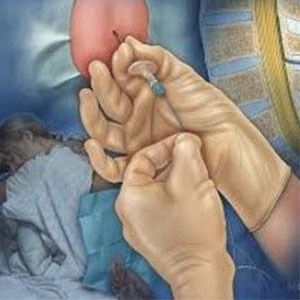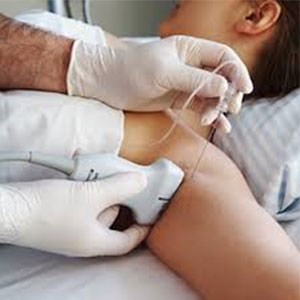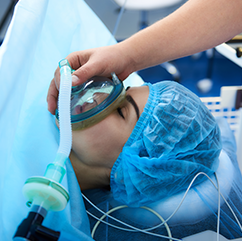Anesthesiology
Dr. Vanda Abi Raad
LAU Gilbert and Rose-Marie Chagoury School of Medicine, Acting Chair of Anesthesiology
Welcome to the Department of Anesthesiology at the LAU Medical Center –Saint john’s Hospital. We are part of a busy urban academic medical center providing advanced clinical care using state of the art medicine, and training the next generation of specialists in perioperative medicine.
Founded in the late 1970’s our Department of Anesthesiology has a long and rich tradition of excellence in clinical care and teaching. I am proud to be associated with its continued growth and success, having taken the reins as chair on several occasions, last being since 2009. We are committed to innovation in perioperative clinical care to maximize quality and efficiency in anesthesia and perioperative pain management, along with translation of novel therapies and healthcare delivery models in a thriving academic environment.
The Department has expanded significantly over the past decade in its provision of clinical care, contributions to hospital administration, teaching within the Medical School at the Byblos Campus and participation in clinical research. We are recognized and respected throughout our institution for our outstanding clinicians, educators and researchers. Our faculty has a wide range of expertise in numerous anesthesia subspecialties and holding leadership positions in the major national and international societies.
Our anesthesia care team includes 8 full time and 4 part-time faculty members, 18 anesthesia trained registered nurses, and 8 residents in training who provide outstanding quality care as we expanded to provide anesthesia care in close to 17 anesthetizing locations not restricted to the operating room throughout the medical center.
Our education program is highlighted by our highly regarded residency program with positions for 8 physicians in training as part of a 4 year categorical program that is structured around the ACGME structure.
Clinical Research in the department is a growing field with close involvement of the resident staff and faculty members equally.
Our department offers the opportunity to practice, teach and discover anesthesia in a collegial environment that provides a wide variety of clinical cases with physicians and scientists who are specialists and leaders in their respective fields. We invite you to explore these pages further to get a taste of the quality and excitement that surrounds our department.
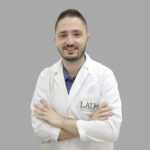
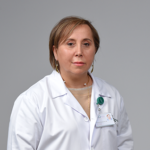

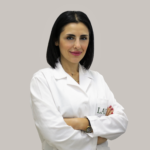
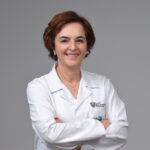
Monitored Anesthesia Care
Monitored Anesthesia Care means that an anesthesia provider will be with you throughout your procedures to provide you with sedative and pain medication. The amount of medication will be carefully measured, and depending on your needs, will result in anywhere from moderate to deep sedation. The end result is that your procedure can be performed without any anxiety or discomfort. During moderate sedation, you will usually be able to speak and respond to verbal cues throughout the procedure, communicating any discomfort you might experience to your anesthesia provider.
During deep sedation, you will be completely unaware of your surroundings. Regardless of the depth of sedation required, your anesthesiologist will monitor your heart rate, blood pressure, breathing, and level of alertness closely throughout and after the procedure.
Monitored Anesthesia Care may be administered to both adults and children for a variety of procedures, including the following:
- Diagnostic radiology procedures, such as MRI, performed by radiology technicians
- Interventional radiology procedures, such as embolization of blood vessels, performed by radiologists
- Cardiac procedures, such as TAVR performed by cardiologists
- Colonoscopies and upper endoscopies, performed by gastroenterologists
- Hysteroscopies, performed by gynecologists
- Eye surgery, performed by ophthalmologists
Regional Anesthesia
Regional anesthesia involves injection of anesthetic medications near a cluster of nerves such that only the area of your body requiring surgery is numb. For example, spinals and epidurals are methods of regional anesthesia which effectively block sensation in the lower half of your body. Peripheral nerve blocks are often used to numb individual limbs, such as one arm or leg. They are also used to provide pain management for truncal procedures. This type of anesthesia is used for many different types of procedures, including orthopedic, urological, abdominal, gynecologic, breast, thoracic and obstetric.
When receiving regional anesthesia, you may remain awake or you may be given intravenous (IV) sedation so that you will be relaxed and sleepy during the surgery. Regional anesthesia tends to result in less nausea and vomiting than general anesthesia. Even if you have general anesthesia for your procedure, a regional technique such as an epidural or a nerve block can be very effective after surgery to prevent or treat pain.
General Anesthesia
Most major operations are performed under general anesthesia. This means that you will be unconscious and have no awareness of the surgical procedure. General anesthesia typically interferes with normal breathing, so your anesthesia provider will manage your breathing for you.
Your anesthesia provider will carefully measure a combination of intravenous and inhaled drugs to allow you to facilitate your surgeon’s ability to perform the procedure and to take you through the procedure safely and comfortably.
Residency
The Anesthesiology residency is a four-year clinical training program. We offer 2 residency positions yearly for a total of 8 residents in the program at any one time. These positions are open to graduates of accredited medical schools. The residency training takes place at LAU Medical Center-Rizk Hospital mainly, where residents rotate in different subspecialties. They also rotate at Clemenceau Medical Center and at Rafic Hariri University Hospital.
Our residents are provided with comprehensive training, whether they wish to purse a subspecialty fellowship, join a private practice or pursue an academic career. Our residents, given progressive and graded responsibility, are offered opportunities to develop the requisite skills to become outstanding anesthesiologists.
The integration of simulation in training plays a pivotal role in our residents’ education whereby several workshops are provided over the course of the year such as the annual airway workshop that is held at the hospital including part task trainers and in situ simulation in addition to the anesthesia crisis resource management course that is required prior to graduation with several hands on simulation sessions where the resident not only plays the role of the student but also the teacher.
Apply for an anesthesiology residency here: medicine.lau.edu.lb/gme/
Medical Students
We offer electives for fourth year medical students from different medical schools. LAU medical students rotate in our department for 3 weeks during their fourth year of training. During their rotation, students are exposed to general and sub-specialty anesthesiology.
Students will be taught basic medical skills such as IV placements, Ventilation, intubation and LMA placements. They also participate in patient examinations, and observe the different types of anesthetics being performed.






